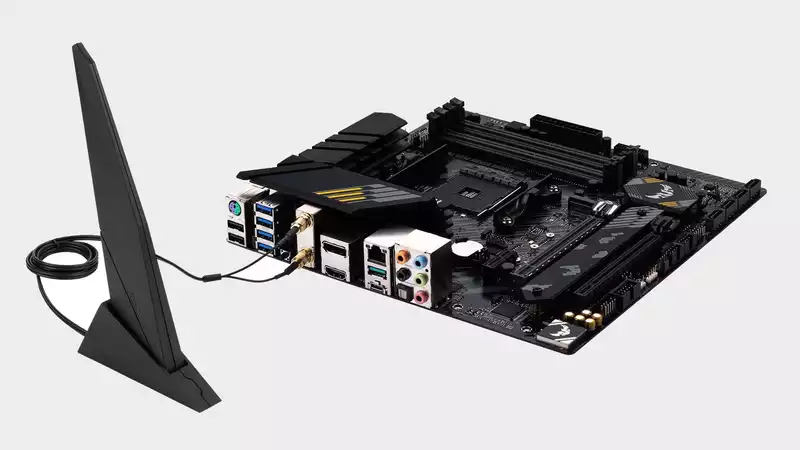AMD's mainstream Ryzen chipset is here, and the Asus TUF Gaming B550M-Plus Wi-Fi wants to be all the mobo you want. But what motherboard features do you need for a decent, up-to-date, no nonsense gaming rig? It's more about sending out lots of frames than pretty lights. PCI Express Gen 4 for graphics cards; check; SSDs as well. Yes. Support for AMD's latest CPU Ryzen 3000 series as well as next generation chips based on the Zen 3 architecture. Yes. High performance networking, both wireless and wired. I see. Support for high-speed USB-C connectivity. Please.
The Asus TUF Gaming B550M-Plus Wi-Fi meets all these requirements. Especially if you can spend the money for components that will give you a clear increase in frame rate. In other words, what exactly is missing in a cheap motherboard?
For example, compared to Asus' much more expensive sister board, the ROG Strix B550-E Gaming, there are some glaring omissions. This TUF Gaming alternative is a Micro-ATX mobo. As such, it is limited in features such as the number of full-length PCI Express slots: two for the TUF and three for the Strix; the TUF does not support SLI multi-GPU graphics as well; and the Strix does not support SLI graphics. Do you care? You won't care.
But you might be a bit more sensitive about the downgrade from six to four SATA ports. And even if the full-size Asus Strix is not superior in that regard, you may find the space around the CPU socket a bit cramped, especially when installing bulky AMD coolers, etc. [You might also be happy if you connect a high-spec SSD to TUF's single PCI Express Gen 4-compatible M.2 slot, and you'll be perfectly happy if your secondary M.2 is limited to four lanes of PCI Express Gen 3, and all four remaining SATA ports with drives You don't intend to fill them.
Similarly, since we rarely plan to change hardware more than once, we may decide that the debug display is a luxury we can live without, and that, in contrast to Strix's Christmas tree-like impression, the paltry 1-2 inches of RGB lighting in the lower corner of the TUF is a real game You may decide that it is not a significant loss.
OK, we are beating a very particular drum with this reasoning. But the point is obvious: what the Asus TUF lacks does not detract from the actual gaming experience.
But what does it really do? That's not entirely proven: at standard clocks running AMD Ryzen 3 3100 quad-core processors, the Asus TUF Gaming B550M-Plus Wi-Fi is the trio of early-look boards with AMD's new B550 entry-level chipset slowest of the three.
The fact that the TUF does not exceed 2,800 MHz on 3,000 MHz DDR4 test DIMMs, despite Asus' Intel-XMP-aping DOCP profile, may have influenced this result. In many cases, however, it is also easy to overstate the importance of the performance difference: 174 points vs. 179 points in Cinebench R15 single-threaded performance compared to the MSI MAG B550M Mortar is surely not a tangible result.
On the other hand, the minimum frame rate of Metro Exodus is 42 fps vs. 45 fps on the MSI board, and the minimum frame rate of Civilization VI is 70 fps vs. 75 fps on the MSI board, both of which are falling short This is a very big performance difference for a motherboard. This is a pretty big performance difference for a motherboard.
However, when overclocking is considered, TUF Gaming turns the tables: 4.2 GHz can easily be achieved on all four cores of the AMD Ryzen 3100 test chip, quickly adjusting core ratios and letting the board handle the details of CPU voltage and more! . This is comparable to the much more expensive Asus ROG Strix B550-E Gaming and marginally exceeds the MSI MAG Mortar's measly 4GHz overclocking ceiling.
As ever, the Asus TUF Gaming B550M-Plus Wi-Fi is a collection of pros and cons. The feature set is adequate for most gaming needs. Yes, the B550 chipset limits bandwidth for peripherals not directly connected to the CPU. If you want to connect a large number of ultra-fast SSDs, this motherboard is not for you. However, it does support a single PCIE Gen 4 SSD, has 2.5Gb Ethernet and Intel Wi-Fi 6, and most importantly, a future-proof Gen 4 PEG-16 graphics port.
It overclocks well and has Asus' familiar full-featured BIOS menu. It has everything you really need for a decent gaming rig on a moderate budget. However, the Asus TUF Gaming B550M-Plus Wi-Fi's stock clock performance cannot be forgiven for being mediocre.
In fact, we have yet to find the ideal B550 board: the Asus ROG Strix B550-E Gaming is perhaps overpriced when X570 boards are available for less; the MSI MAG B550M Mortar lacks overclocking; and the Asus TUF Gaming B550M-Plus Wi-Fi is a bit of a disappointment. And the Asus TUF lags well behind in basic performance and is hard to recommend out of hand. Thus, the hunt continues.
.

Comments